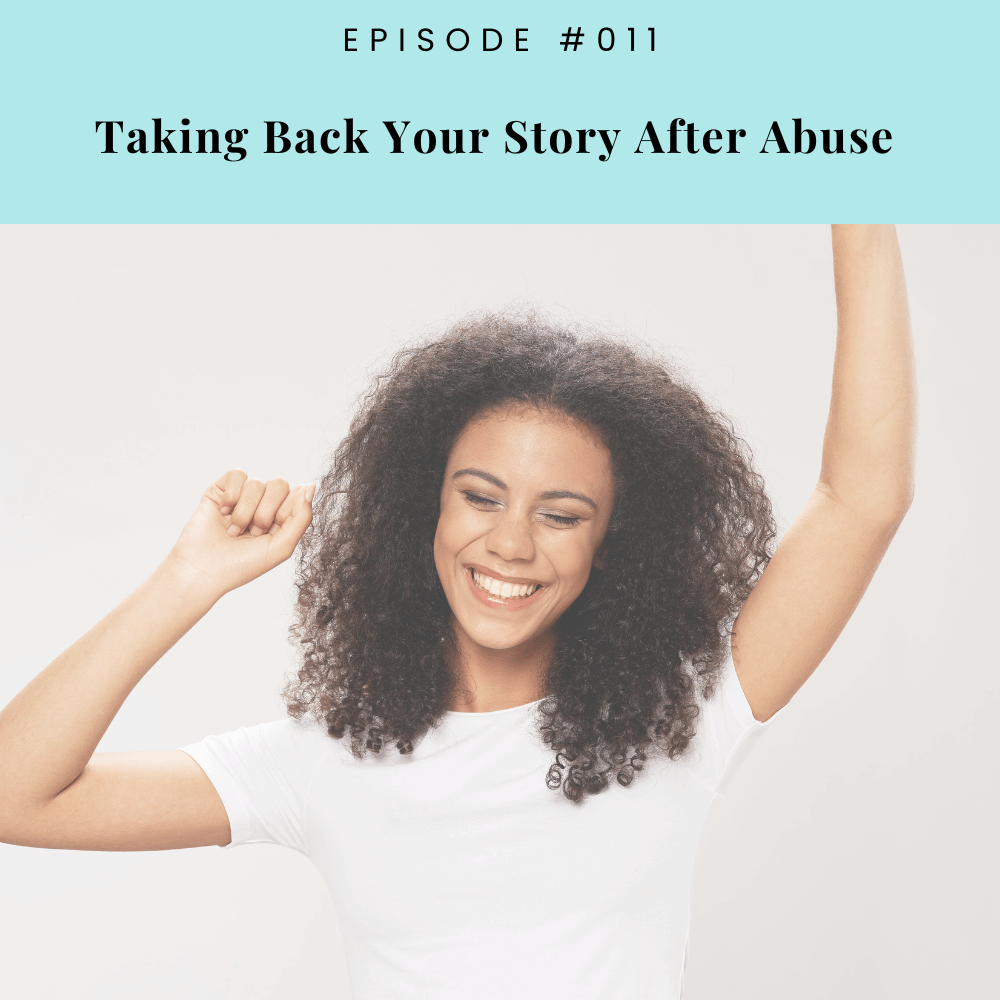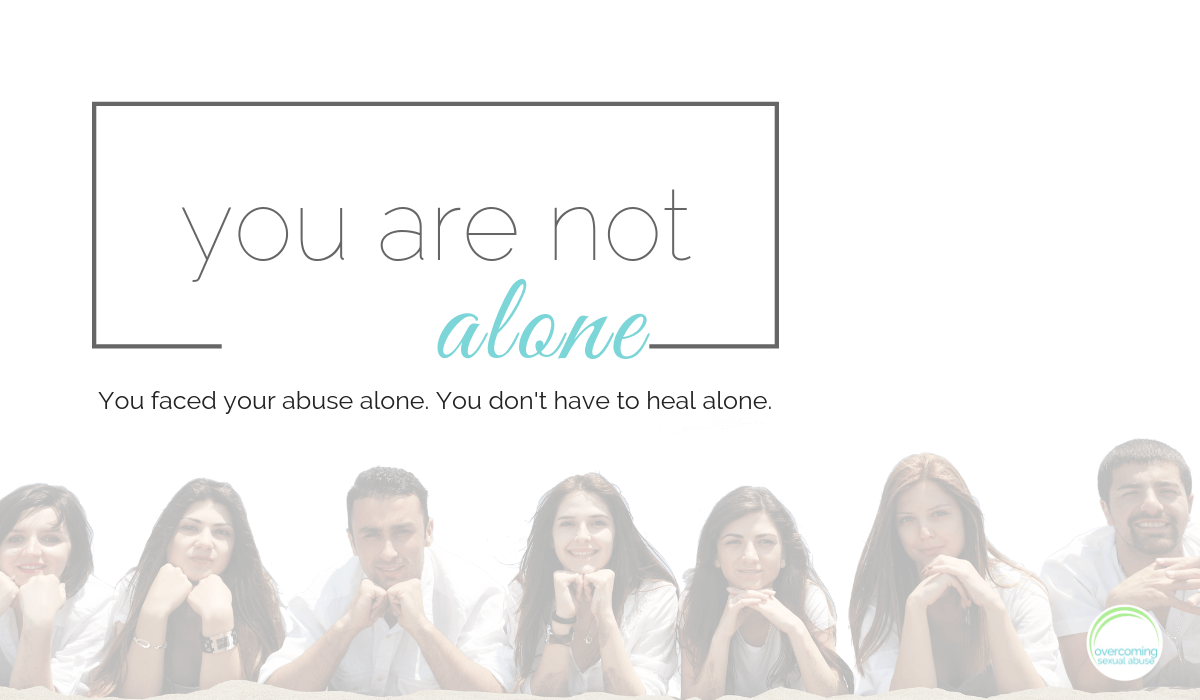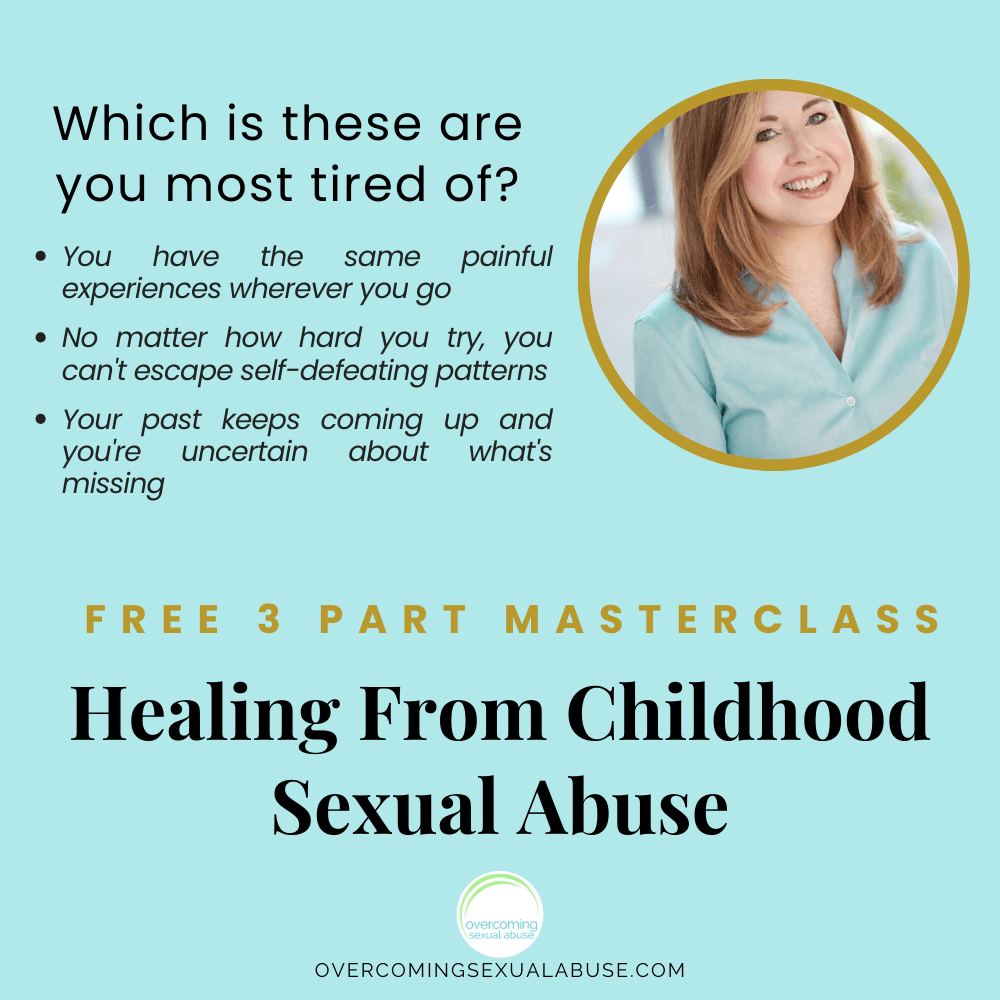
Key ideas:
[00:00] – Introduction
[00:28] – An example of how false stories are applied to us
[02:59] – How abuse prepares us to live a very limited story
[03:24] – An example of living out that story by default
[04:28] – My default story and my aha moment that prompted me to write a new story
[08:05] – Why having a terrible start to your story doesn’t mean you have to have a bad story
[08:45] – The reason it’s not a problem if you feel unqualified to change your story
[10:34] – The one thing that will determine if you have a good ending to your story or not
[13:38] – How to become the author of your own story
[15:43] – Invitation to my annual masterclass on Healing From Childhood Sexual Abuse
Relevant Links:
Free Resource:
Healing From Childhood Sexual Abuse Masterclass
Links Mentioned:
Registration for Healing From Childhood Sexual Abuse Masterclass
Quotes:
“What if life is like a story? What if it’s not up to God or fate to decide how long the tough times last? What if I decide when things in my life get better based on the actions that I take? What if my story isn’t moving in the direction that I want, because in my life, I’m supposed to take the role of the hero, and heroes aren’t meant to passively sit on the sideline?”
“Engaging with your story requires you to change. It’s not about where you start. Of course, you’re not the person who could do all those things you want to do. But when you set off to live your story, it’s like on the job training. You don’t have to feel qualified. The challenges you face, they’ll qualify you, they’ll train you. Little by little, your experiences, they change you. They pull things out of you that you never thought you were capable of.”
“You only take back control by taking action and making changes. The call to adventure-to own your own story-requires braving the unknown, embracing that discomfort, that uncertainty. That’s the only path forward.”
Be the first to know:
As an insider, you won’t miss any of my healing resources and latest updates.
Episode transcript:
Welcome to the Overcoming Sexual Abuse Podcast, where you get the tools and inspiration to help you overcome childhood sexual abuse. I’m your host, Christina Enevoldsen, certified coach, author, and incest survivor, and I’m here to help you heal and live your very best life.
Childhood abuse forces us into a role and story that isn’t our own. If you feel that someone else or some outside force has control over your life,
this is how to take back control. You can rewrite your story and create the ending you want.
We just welcomed a new baby into our family and as soon as he was born we looked at him and started identifying what other family members he reminded us of or resembled and we’ve observed that his temperament and behavior is sweet and calm.
And with other grandkids we’ve said she’s such a great performer or he’s so good at science or she has very big feelings and that could be good to identify those characteristics and strengths so they can be nurtured and those things are meant to help a child to develop what’s in them.
But what if we decided that this new baby was difficult or that he wanted too much attention? And what if as he’s learning to eat he spreads food on his face or drops food on the floor and he’s labeled messy? And what if in a few years he takes a cookie he wasn’t supposed to and he lies about it and now he’s known as a liar? And what if when he goes to school he likes to ask questions and now he’s And what if when he starts playing sports and he’s not very good at it and now he’s a loser?
What if he believed those things? How would that impact how he felt about himself? What if he thought any of that dictated his future and what was possible for him? What if something happened to him? And because of that, he thought the whole course of his life was decided. What he was and wasn’t capable of, what he deserved or didn’t deserve? What he was qualified for or unqualified for? Or what he would or wouldn’t be? Where he would fit in? Where he wouldn’t fit in? Or what he did and didn’t have permission to do? What he was likely or unlikely to achieve or to have?
Throughout your life, beginning in childhood, other people and experiences shape your story. You’re vulnerable to what others say about you when you’re a child and what you observe about your experiences and your place in the world. Things like, I’m not lovable. I’m all alone and I can’t count on anyone. I’m disgusting. If anyone really knew me, they wouldn’t like me.
And you adopted beliefs about how the rest of your story would unfold based on what you believed about yourself. And chances are you’ve lived your story by default.
There’s a meme going around right now and it says, we don’t get over it or move on from our trauma. We are forced to make space for it, to carry it. We learn to live with it. And sometimes we thrive in spite of it.
And that’s a default story. Because of trauma, you’ll never quite be whole. You’ll always live with it. It will define you. You’ll always feel the effects of it. And sometimes, and don’t get your hopes up, you might thrive in spite of it.And most survivors live that default story, just making the most of a bad situation, coping and learning to live with it.
And it’s easy to understand why, because abuse and its effects seem all permeating and all encompassing. And abuse programs you for this fixed set of circumstances instead of a best life that you can create for yourself.
My abuse gave me stories about myself that left me shameful, alone, weak, helpless. And I continued to live in that story for most of my life.
I went on to marry and divorce a child molester. And I experienced many other relationships and circumstances that confirmed that I was shameful and alone and weak and helpless.
And I believed that certain people were meant to be happy or successful and some weren’t. And I thought I probably wasn’t. And Don and I used to live in Hollywood. And Don, who’s a writer, studied story structure and had written a few screenplays. And many of our friends were in the entertainment industry. And you might know that story is a huge part of making TV and movies. And being around that, I picked up some principles of story writing.
And I learned that the basic structure of a story is the hero wants something, maybe a love interest, a job, a trophy, freedom. The hero has to take some action to get that. And the hero encounters external obstacles to get what she wants. And then the hero has to overcome an internal obstacle to overcome the external obstacle. Some fear of some kind, maybe a belief or some other flaw. And then the hero’s victory, overcoming the flaw, empowers her to take the right actions. And then the hero’s right actions lead to the desired results.
But the overarching point is that the story is at the effect of the hero. The story doesn’t happen to the hero. The hero happens to the story. And the story only moves if the hero moves. For the circumstances to change, the hero has to change. And that was really interesting to me, but as far as I knew, it only applied to fictional stories.
Then one day, I was contemplating our situation. We’d been going through some tough times, and I was getting really discouraged. And I believed, and I didn’t even know that I believed, but I believed that I was the victim of fate, or God, or some higher power, maybe divine or human. But all I knew is that I didn’t feel in control of my life. And it was just a matter of maybe patiently enduring, or maybe patience would earn me some good graces. And then I just had to wait it out. Or maybe I had to become a better person or earn a better life, but I just wasn’t sure.
As I thought about all of that and what we were going through in the direction of my life, I had a thought that shifted everything for me. What if life is like a story? What if it’s not up to God or fate to decide how long the tough times last? What if I decide when things in my life get better based on the actions that I take? What if my story isn’t moving in the direction that I want, because in my life, I’m supposed to take the role of the hero, and heroes aren’t meant to passively sit on the sideline? And when I had that thought, it was just one of those moments where the truth just reverberated in me. And that’s when I knew that my life was in my hands.
I write my own story.
In the beginning of your story, things were outside of your control. You didn’t decide who your parents would be, where you lived, what your experiences would be. And the beginning was started for you by outside forces. And abuse is a horrible start to the story.
And every story has a villain. And maybe that’s your abuser, or maybe you see the abuse itself as the villain. And you were victimized. You didn’t have a choice in that. But what happens now? How will the rest of your story go?
Have you ever noticed that the best stories have the most unlikely of heroes? In the best stories, the hero has this huge gap from where they start to where they finish. And it’s so fulfilling to see that underdog shock everyone by being the one who saves the day or saves the world. And we love stories like that because at our core, every human, and it’s not just abuse survivors, we all feel like the unlikely hero. The one who no one notices or thinks is hero material.
And that’s actually the point because engaging with your story requires you to change. It’s not about where you start. Of course, you’re not the person who could do all those things you want to do. But when you set off to live your story, it’s like on the job training. You don’t have to feel qualified. The challenges you face, they’ll qualify you, they’ll train you. Little by little, your experiences, they change you. They pull things out of you that you never thought you were capable of. And the hero must change for the story to end well.
A story where the hero learns the lessons, takes the correct actions, and gets the right results, that’s called a comedy. When the hero doesn’t learn, doesn’t take the right actions, doesn’t experience the right results, that’s called a tragedy. And so if you’re looking at the beginning of your story and you’ve concluded that your life won’t be much more than a tragedy, keep in mind that all the best stories begin with something being really wrong.
And in the most fulfilling, they’re very, very wrong. So the beginning of your story just could be the beginning of an amazing story.
So if this is your villain’s story, the villain is the one moving the story forward, the one taking the action. Is it your abuser’s actions that you want to make the most impact in your story? Because to make it your story, it’s about what you do as a response to the villain.
Newton’s first law of motion states that things cannot start, stop, or change directions all by themselves. They require some force from the outside to cause such a change. A body at rest or uniform motion will continue to be at rest or uniform motion until or unless a net external force acts upon it.
So if your story isn’t changing, the external force that needs to act on it and get it moving is you.
So the current version of you isn’t adequate to achieve your desire. And you need to adapt to live into that vision, live into that story that you do want. But no character in a story actually wants to change. She has to be forced into the situation when the stakes are so high that she has to change. And it’s actually the same in real life and nobody wants to change.
Maybe you want to be comfortable, that’s understandable. You’d rather have the world change to fit you, have things easy and go your way. Who doesn’t want that? And that’s the reluctant hero. She resists the call to adventure. In your known world, you’ve constructed comfortable habits and your brain can feel safe so that you can ignore most of what goes on around you. Why should you expend energy if it’s not a threat? Therefore, you can live unconsciously.
And resistance then to this call to adventure comes as a friend to keep you safe. And even if your current circumstances aren’t exactly how you want them, it’s a story you feel like you can control since it’s familiar. And even the expectation that it’s going to keep on being bad gives you a sense of control. And yet the irony is, by keeping things the same, you don’t actually control your own life.
You only take back control by taking action and making changes. The call to adventure to own your own story requires braving the unknown, embracing that discomfort, that uncertainty. That’s the only path forward.
And yet resistance will always try to block you. It’s the first of many obstacles between you and what you want. And the obstacles aren’t there to stop you, but to provoke the best in you so you can achieve your desired goal. And that’s what’s going to help you change. So living a new story requires something different, a new version of you. And in the animal kingdom, animals produce variants to adapt to a changing environment. And these variants, they’re just a tiny little bit different from their parents. An example of that is mosquitoes, they produce thousands of eggs, and each of those are just a little bit different. And very few are going to survive, but the ones best suited to the current environment will survive. Well, humans don’t do that. We have a different way of adapting. And you have the ability to create variations inside of you, you inside your brain, and you can generate variant personalities of yourself to determine how that variant would perform even before manifesting that part. So you can evaluate what characteristics would equip you to achieve that and live into that new story that you want, and then you can embody that and take action. And if you have trouble imagining it, who do you know who has overcome something similar? What qualities do they have? What characteristics can you emulate? And this isn’t about faking it. This is about if you can imagine it in them, it’s also in you. So step into that, embody that. And if you don’t know anyone, you can use a fictional character that works just as well.
No matter your starting point, this moment, you can change your life. You can take one decisive action toward writing your own story. There’s never been another person who could change your life for you, but right now you can choose discomfort over the easy way. You can set out to see what you could accomplish when you can choose a life of adventure to own your story to write your own ending.
Well, thanks for joining me today. If you’re ready to change your story, I want to invite you to my free virtual event, Healing from Sexual Abuse, where I show you how to take back your life. It’s coming up, so register now at overcomingsexualabuse.com/masterclass.

